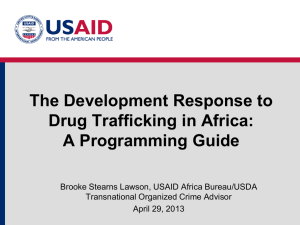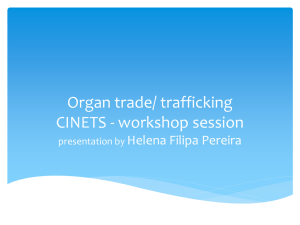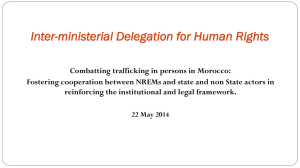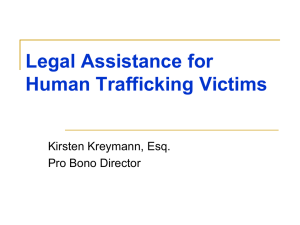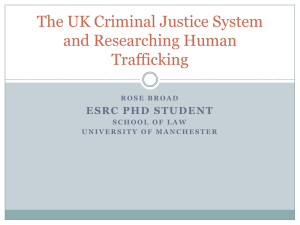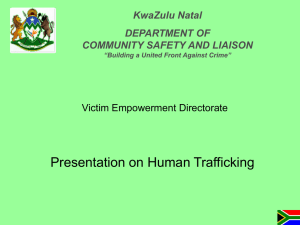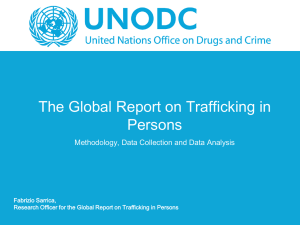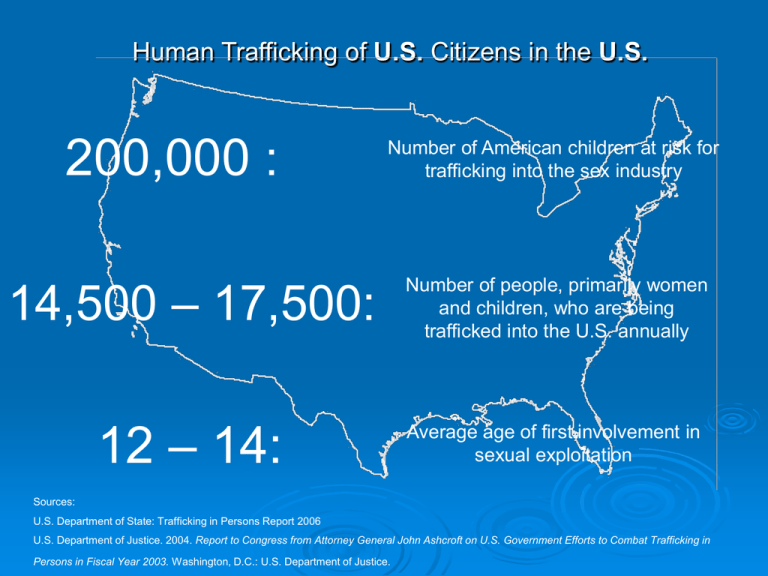
Human Trafficking of U.S. Citizens in the U.S.
200,000 :
Number of American children at risk for
trafficking into the sex industry
14,500 – 17,500:
Number of people, primarily women
and children, who are being
trafficked into the U.S. annually
12 – 14:
Average age of first involvement in
sexual exploitation
Sources:
U.S. Department of State: Trafficking in Persons Report 2006
U.S. Department of Justice. 2004. Report to Congress from Attorney General John Ashcroft on U.S. Government Efforts to Combat Trafficking in
Persons in Fiscal Year 2003. Washington, D.C.: U.S. Department of Justice.
Routes of International Trafficking into the United
States, 2007
Source:
The Future Group, Neha Mathur, March 2007: http://tfgwebmaster.site.aplus.net/wwwthefuturegrouporg/id20.html
As of 2009, Toledo is number FOUR in the nation in terms of
the number of arrests, investigations, and rescue of domestic
minor sex trafficking victims among U.S. cities, according to
the Northwest Ohio Innocence Lost Task Force.
City Populations
County Populations
600000
2,500,000
500000
400000
300000
200000
2,000,000
Miami
Portland
Las Vegas
Toledo
1,500,000
1,000,000
100000
500,000
0
0
Miami
Portland
Las Vegas
Toledo
Source:
“Toledo rated fourth for youth-sex trade in U.S.; city tops per capita for arrests, rescues of children.” Jim Provance, The Toledo Blade: February 11, 2010
Trafficking in Persons Study
Commission
• studying and reviewing the problem of
human trafficking, particularly as it affects
Ohio;
Office of Senator
Teresa Fedor
• studying and reviewing Ohio's criminal
statutes to determine their treatment of human
trafficking;
• and developing recommendations to address
the issue of human trafficking and to improve
and expand the criminal statutes as
necessary.
Trafficking in
Persons
Study
Commission
Legal
Training
&
& Law
Legislative
Enforcement
Subcommittee Subcommittee
(Judge Peter
Sikora)
(Lt. Matt
Warren)
The Trafficking in Persons Study
Commission is composed of 6
subcommittees that: study what can be
done to help law enforcement, medical
professionals, prosecutors, and judges
respond to instances of human
trafficking; study what laws exist in Ohio
and other states to address trafficking;
study what can be done to keep
individuals from becoming victims; study
the services provided to trafficking
victims; study what drives demand and
what steps need to be taken to address
the issue; and study the scope of the
problem in Ohio.
Prevention,
Victim
Outreach
Assistance
&
and
Education
Safe Locations
Subcommittee Subcommittee
(Crystal
Ward-Allen)
(Michelle
Hannan)
Demand
Reduction
Subcommittee
(Norma Ryan,
Jewel Woods)
Research
&
Analysis
Subcommittee
(Dr. Celia
Williamson)
Why has Toledo become a hub of human trafficking?
• Proximity to the Detroit International Airport
• Easy access to Canada and the East Coast
• Prevalence of agricultural farms, massage parlors, strip
clubs – where trafficking victims are often enslaved
• Large immigrant communities where it is easy to hide
foreign-born trafficking victims
• Lenient laws and little risk for traffickers
Human Trafficking of OHIO Citizens in OHIO
2,879:
Estimated number of youths born in
Ohio who are at risk for commercial
sexual exploitation
1,078:
Estimated number of youths born in Ohio
who have been sexually exploited over
the course of a year
3,437:
Estimated number of foreign-born Ohio
citizens who are at risk for trafficking in
labor or the sex trade, 783 of whom are
actually being trafficked at any one time
Source: Trafficking in Person Study Commission: Prevalence of Human Trafficking in Ohio, 2009
Report on the Prevalence of Human Trafficking in Ohio
Factors that Increase Risk to Ohio Youth
1. Ohio’s weak response to trafficking victims
2. First responders are unaware and
unprepared
3. Customers and traffickers remain protected
4. High rates of vulnerable youth in Ohio
Source: Trafficking in Person Study Commission: Prevalence of Human Trafficking in Ohio, 2009
The Impact of Sub. H.B. 280:
Sub. H.B. 280 created a human trafficking sentencing
enhancement (ORC §2941.1422). It covers only sex – not
labor – trafficking cases. If a person is charged with two
sex trafficking related felonies (i.e. abduction, or compelling
prostitution) the sentencing enhancement may be attached,
which will mandate prison time of at least 12 months.
ORC §2941.1422 is a complicated law, e.g.
requiring that both relevant felonies be named at
indictment, and therefore it has never been utilized.
Sub. S.B. 235:
Sponsors: Senator Teresa Fedor (D) & Senator Tim Grendell (R)
Main Text: It is a felony of the second degree to: “Recruit, lure, entice,
solicit, isolate, harbor, transport, obtain or maintain or knowingly
attempt to recruit, lure, entice, solicit, isolate, harbor, transport,
provide, obtain, or maintain, another person knowing or having
reasonable cause to believe that the person will be subjected to
involuntary servitude or be compelled to engage in sexual activity for
hire, engage in a performance that is obscene, sexually oriented, or
nudity oriented, or be a model or participant in the production of
material that is obscene, sexually oriented, or nudity oriented.”
Amended Text: The criminal charges of conspiracy and pattern of corrupt
activity now include human trafficking. Definition of “human trafficking”
extended to include both sex and labor trafficking.
Opposition to Sub. S.B. 235:
Don’t we have sufficient laws on the books to address human trafficking?
NO. Trafficking in humans is a complicated and organized crime that has not
been fully addressed through legislation.
Isn’t this this bill just benefiting undocumented immigrants?
NO. This bill will help Americans who are victims of labor or sex trafficking –
victims who are born here, raised here, and trafficked here. The bill will also help
non-Americans who are being exploited in a similar fashion who are being
exploited on American soil.
Does this legislation make prostitution a human trafficking offense?
NO. The bill refers to sex or labor that has been “compelled.” An average
solicitation interaction involving a voluntary exchange between an adult prostitute
and a john or an adult prostitute and a pimp would not fall under the purview of
Sub. SB 235. However, because children can never voluntarily consent to sex,
Sub. SB 235 protects sexually exploited children as human trafficking victims.
Sub. H.B. 493:
Sponsor: Representative Kathleen Chandler (D)
Criminal provisions: same as Sub. S.B. 235
Additional provisions: Allows victims to sue their former
traffickers ■ Requires human trafficking training for law
enforcement ■ Development of public awareness programs
through the Office of the Attorney General ■ Requires
particular establishments, such as truck stops, to post the
national human trafficking hotline number ■ Mandates that
minor victims be provided necessary protection and services
Human Trafficking: 10 Worst States
The Polaris Project evaluated states on the following criteria: 1) incidents of sex trafficking, 2) incidents of
labor trafficking, 3) asset forfeiture for human trafficking crimes, 4) training on human trafficking for law
enforcement, 5) human trafficking commission, task force or advisory committee, 6) posting of a human
trafficking hotline, 7) safe harbor, 8) no requirement of force, fraud, or coercion for minors, and 9) victim
assistance, 10) civil remedy
Source: Polaris Project, www.PolarisProject.org, July 2010
The Palermo Protocol: What Makes a Good
Anti-Trafficking Law?
• A broad definition of the concept of “coercion” that covers its many
manifestations in modern forms of slavery, including the threat of physical and
financial harm.
• A well-articulated definition of trafficking that includes all forms of
compelled service in addition to forced prostitution.
• A mechanism of care provided to all suspected victims of trafficking through
which they have the opportunity to access basic services – including shelter,
food, medical care, psycho-social counseling, legal aid, and work authorization.
• Explicit immigration relief for trafficking victims and relief from any legal penalties
for unlawful activities committed by victims as a direct result of their trafficking.
• Specific protections for child victims of trafficking ensuring a responsible chain of
custody and a priority placed on the best interests of the child in all decisions
made in providing services to them.
• Explicit provisions ensuring identified victims have access to legal redress to obtain
financial compensation for the trafficking crimes committed against them.
Source: Trafficking in Persons Report, 10th Edition. U.S. Department of State, June 2010. http://www.state.gov/documents/organization/142979.pdf
In 2010, more than
40 bills related to
human trafficking
have been enacted
and roughly 350
introduced in state
legislatures across
the country.
Connecticut passes
the Safe Harbor for
Exploited Children
Act (2010)
Illinois, Texas, and
New York have taken
some promising
steps towards safe
harbor legislation
protecting sexually
exploited minors.
Illinois Legislature Passes
Bill Protecting Sexually
Exploited Children (2010)
Sources:
Texas Supreme Court Rules:
Children in Prostitution are
Victims, Not Criminals (2010)
New York Passes the
Safe Harbor for
Exploited Youth Act
(2008)
Polaris Project Press Release, “Illinois Legislature Passes Bill Protecting Sexually Exploited Children,” May 26, 2010
http://www.polarisproject.org/images/hb%206462%20il%20press%20release%205-26-10%20final.pdf
Savage, Michael. “State legislatures step up efforts to fight human trafficking,” The Washington Post, July 19, 2010: A3
Shared Hope International: “Connecticut Safe Harbor Law will protect child sex trafficking victims,” June 3, 2010 http://www.facebook.com/notes/shared-hopeinternational/connecticut-safe-harbor-law-will-protect-child-sex-trafficking-victims/426323201693
Smith, Morgan. “Texas Supreme Court Rules on Child Prostitutes,” The Texas Tribune, June 18, 2010
Human Trafficking Awareness:
http://24.106.127.82/Awareness%20of%20Human%20Trafficking/player.html
Human Trafficking Response:
http://24.106.127.82/Responding%20to%20Human%20Trafficking/player.html
“Those who profess to favor freedom, and
yet depreciate agitation, are men who
want crops without plowing up the ground.
… This struggle may be a moral one; or
it may be a physical one; or it may be
both moral and physical; but it must be a
struggle.”
Frederick Douglass,
American abolitionist



